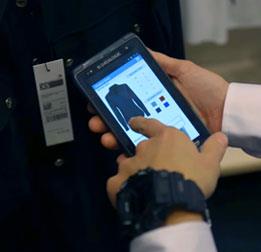
Solutions for Retail Store Operations
Solutions for Retail Store Operations
WHAT DOES “RETAIL STORE OPERATION” SOLUTIONS EXACTLY MEAN?
The words retail store operations encase all the activities carried out at the physical store, ranging from customer service tasks to administration and management responsibilities. The amount and setup of the individual operations vary from store to store, depending on the company’s organizational layout and business goals.
We will start addressing the main retail store operation solutions and the way to improve them, and finally, we will introduce the dedicated products and services provided by Datalogic.
THE MAIN RETAIL STORE OPERATION SOLUTIONS
Based on the size, a retail business can organize operations in distinct, hierarchical departments, or make them fall under a single, versatile unit. The overall scope of the company is not the only factor determining the layout of the operations; another one is the nature of the business itself. In fact, if retail usually implies the providing of “goods or services,” today’s market is flooded with many hybrid instances, which include the sale of both products and services at the same location. This is especially evident when we cross over into the field of e-commerce, which has its own specific pathway to set, execute and manage retail store operation solutions.
Whether physical or online, the main retail store operation solutions are the following:
- Design. A remarkable shopping experience starts from the store’s aesthetics. You can think of design as the brand/store personality expressed through the store location, the department organization, the visual display of merchandise, the atmosphere created by lighting, music, perfume, etc.
- Customer service. Customers’ satisfaction is the litmus test of a retail business's health. When store managers focus on delivering a positive, personalized customer service experience, the competitiveness of their business can easily skyrocket, making them strong enough to challenge even the biggest competitors.
- Cash, fraud, and internal controls. Store staff needs to thoroughly look after safety and security in the shop, by monitoring the handling of cash and credit cards, preventing shoplifting and fraud, and defining shared, data-driven procedures for internal controls.
- Product inventory. Inventory management is the fourth, essential retail operation. Balancing the supply and demand flux as well as the selling and restocking of an ever-changing park of products is a complex task for most stores. Furthermore, the current abnormalities suffered by supply chain operations have contributed to making things even harder. For this reason, retail stores need to adopt automated inventory management solutions to face the challenges ahead.
- Administration. Managing store premises, promotions and events, training of employees as well as data management are all activities falling under administration duties. Owning an automated management system can help scale down the number of tasks in need of real-time supervision.
- Store management. Keeping the daily flow of operations uninterrupted is the top priority and responsibility of store management. Additionally, store managers need to execute comprehensive strategies and directives coming from regional or corporate managers, effectively acting as a bridge between the shop and the head management.
Responsibilities may include:
- Hiring, firing, training, and managing employees
- Forecasting sales and budgeting
- Oversight of inventory and loss prevention
- Oversight of all internal controls, such as cash handling
- All aspects of customer service
- Internal and external communication
- Legal compliance
HOW CAN RETAIL OPERATIONS BE IMPROVED?
When efficiency drives retail store operations, companies can even exceed the forecasted return on investment. Operations in the retail industry can be improved in the presence of an all-around strategy encompassing multiple areas within the physical store. Store managers must design the shopping experience around customer satisfaction if the retail business is to thrive.
To help you set up your own plan, we put together a list of hints and suggestions to improve your retail operations.
- Use your customers’ unique information to push for a valuable, data-driven upsell.
- Enhance your inventory management, get a Point-of-Sale system that is connected with your online inventory in real-time.
- Collect your customers’ email addresses and set an email marketing strategy to lay the groundwork for customer retention.
- Magnify your CRM to keep a record of your customers' purchases to create customized promotions and deliver a personalized customer experience.
- Leverage stores as a point of contact to customers, extending the online services, customer support and proximity presence.
- If you are considering expanding your business online, a 3PL (third-party logistics) can be extremely helpful in scaling up your e-commerce.
DATALOGIC SOLUTIONS FOR RETAIL STORE OPERATIONS
Datalogic is a worldwide retail leader for 40 years. Datalogic has solutions for retail store operation are targeting the whole retail supply chain, including full digital imaging devices, automated scanning portals, mobile computers, and handheld scanners. Our solutions for the retail industry aim at enhancing customer experience at the physical store and easing store staff activities with data-driven solutions.
Self-shopping
Grocery check-out
- QuickScan 2500 Series
- PowerScan 9500 Retail Series
- Magellan Bioptic series (i.e., 9800i, 9400i, 9300i)
- Magellan 1500i
- Joya Touch
- Gryphon 4500 Series
Product & pricing management
Inventory management
Shelf replenishment
Queue busting
Applications
Success Stories
Video Gallery
Datalogic Solutions for Distribution Centers
Datalogic supplies 200 scanners to "Best Retail Chain in Belgium"...
Inco opens the first fully automated Cash and Carry in Denmark with...







